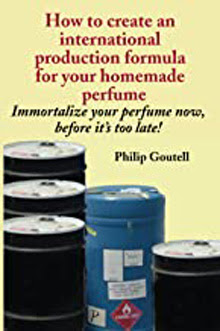In the book I just finished a few long weeks ago -- Making Perfume By The Quart: A do-it-yourself project book -- there's as chapter on selecting the fragrance oil you're going to use for this project. What it comes down to is a choice between using an oil you've made yourself, purchasing your oil ready made from one of the many available sources, or commissioning a fragrance house to create an oil for you, to your specifications. Your choice of which path to take will depend on the purpose for which you are undertaking this project.
If you have been creating your own fragrances and want to see one of them turned into a commercial product, by all means use that oil for the 'quart'. But if your goal is to sell as much of your new fragrance as you can... if you want that quart to be just the first stepping stone toward producing thousands of bottles of your fragrance, then you should strive to find the best fragrance you can get your hands on, regardless of who made it.
For ten years or more I've been working on a small scale with fragrances I've created myself. Before that I had larger success with fragrances I purchased from others, fragrances that were created by skilled industry professionals. Of my own creations there are only two I would judge outstanding. Both are for men and I use them daily. They are not, I can point out, everyone's taste. But they are good. But, while really good in quality, they are not every man's taste. Taste and quality are different animals.
A few other of my originals I would judge "pretty good." At least the scents are interesting. My wife will use them from time to time and I think she holds back a little for fear of running out. Others of my creations are junk. You could use them. They don't smell bad. But I know perfectly well they weren't well crafted.
If you're going to put money into a marketing a fragrance, you want that fragrance to be the best you can come up with.
So whether you're making a quart of perfume or ten gallons, if you plan to put money into marketing it your first and most important step is to find a fragrance -- an oil -- a composition -- a formula -- that is the best, most likely to sell, fragrance you can find. If you make your own fragrances but know, that while you like them and are proud of them, they aren't as good as what you could buy elsewhere, buy the one you know is better, even if it bruises your pride and vanity -- if you're doing this to make money.
Let me give you a personal example. I have a fragrance called Moonfaire. I can't recall how long ago I made it but, when I arrived at our vacation home in Canada last week, I found a bottle on my desk. So I tried it to see how I liked it. I wasn't impressed. It seemed to heavy. So I thinned it down with alcohol to make it more of an eau de cologne. Perhaps this helped a little. Perhaps in time I could like it. But I couldn't take pride in it. I liked the name but the fragrance had never really come together. It was something of an embarrassment.
Before you set out to develop a fragrance to sell, you've got to get familiar with what people are buying. Haunt fragrance counters. Sample every scent you can. Find out which are the best sellers and get a few whiffs of them. How do they smell? This is the smell of success. If sales are what you are looking for, find a scent that will be acceptable in a market where money is being made.
Hold up a bit.
Not everyone wants to be a copycat. In the distant past I worked with people who make very good money by being quick to invest large amounts of money in a products that simply copied the latest hot product. These people couldn't do something original to save themselves but they were very good at spotting hot products they could copy. They were acquired by a publicly traded company.
For me, the real excitement comes when an odd-ball product, a fragrance for example, emerges as a big winner and yet is truly original. These breakthrough products are rare and investing in them is risky. But you may have one. How can you tell? When you've sampled everything else and, although your fragrance is different -- not at all like the current big winners -- and yet you are certain it is quality, you may have something worth putting your money into. How do you go about it? Try making a quart or two and shopping it around to see if anyone stands up and salutes. But remember, start with a quart. Test with pennies. Hang on to your dollars. You'll need them for production and promotion should that quart turn out to be a big winner.

